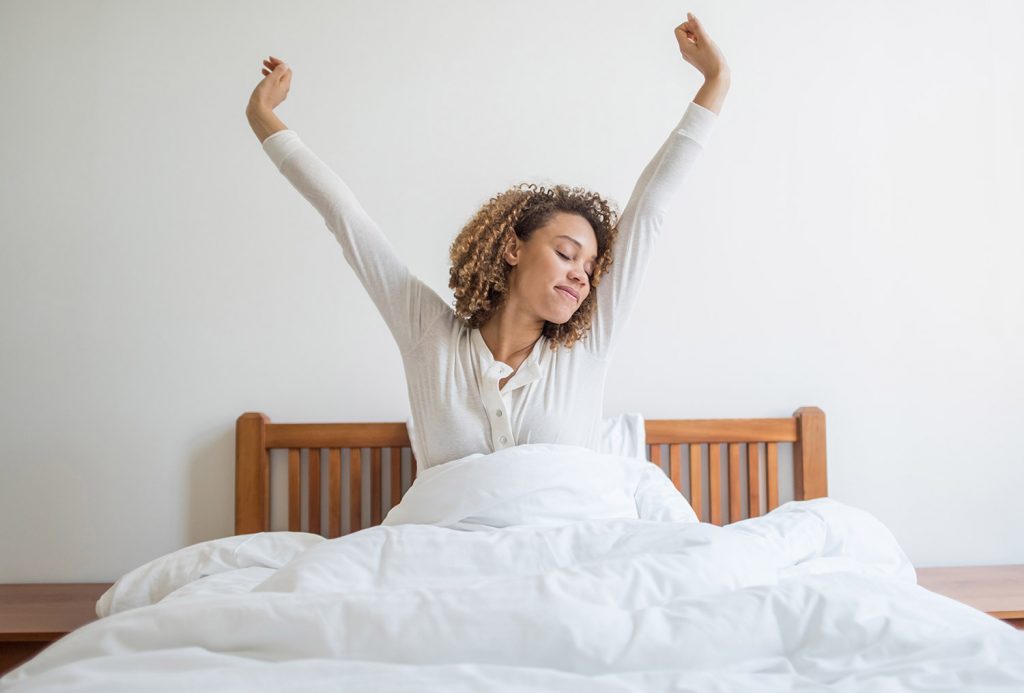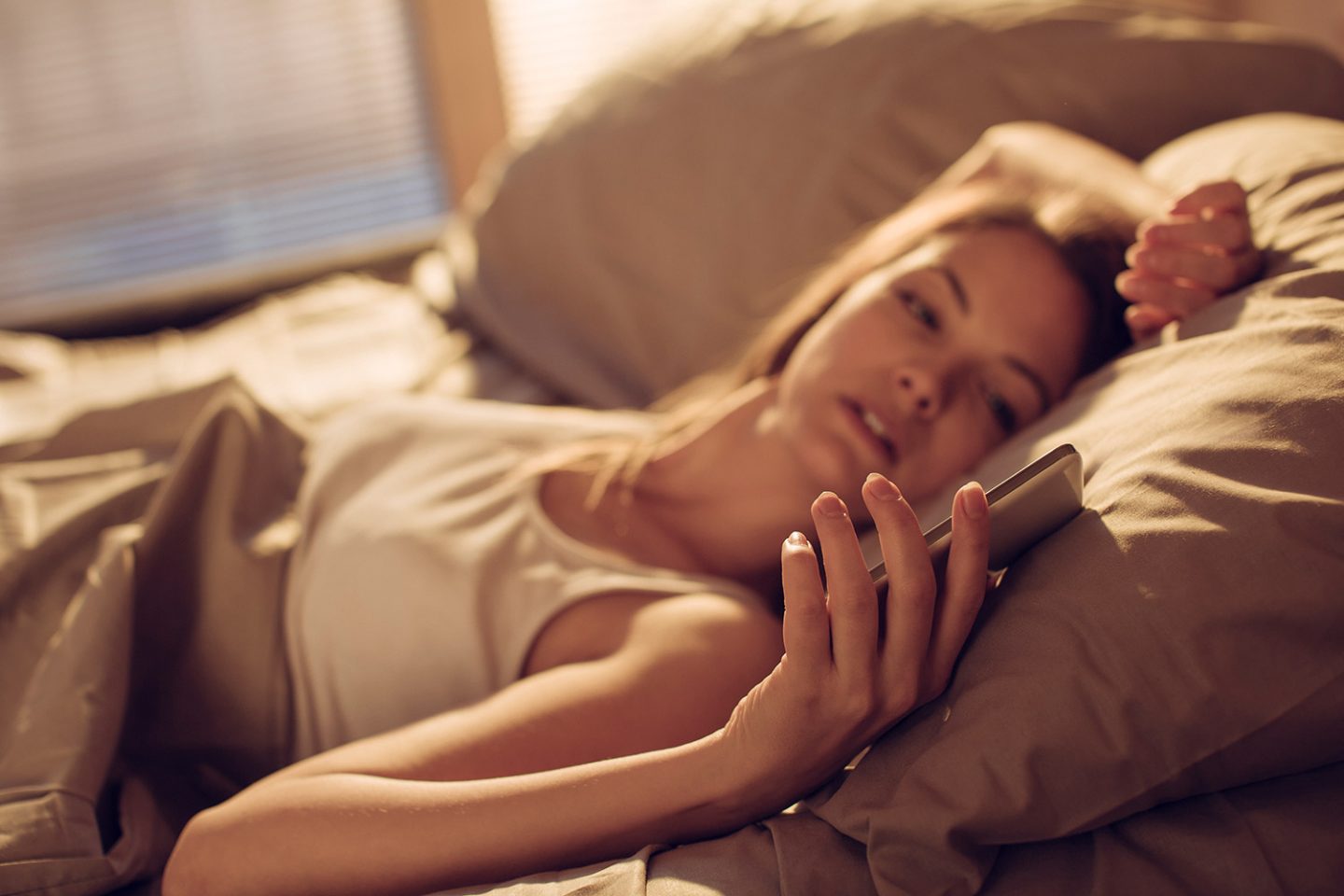Sleep is good for you. A satisfying night’s rest can make all the difference to how you feel the next day. But good sleep doesn’t just make you feel better, it’s also essential for your health. While you’re sleeping, your brain and body undergo all kinds of restorative processes that regulate growth and stress hormones, appetite, breathing, blood pressure and immune and cardiovascular systems. Insufficient shut-eye compromises all these natural functions. Here are eight simple tips to help you enjoy better and healthier sleep:

1. Make your bedroom sleep-ready
Check your bedroom is as comfortable, restful and sleep-friendly as possible. If too much light is preventing you from falling asleep, try fitting thicker curtains or a blackout blind to darken the room. Keep the temperature moderate (ideally 18C -24C) and not too stuffy or cold. Remove any technology items that could distract you with bright screens, alerts and incoming messages or calls. When it’s time for sleep, TVs, laptops, tablets, smartphones and other devices should be kept in other rooms. Even if tidiness isn’t your thing, try and declutter the bedroom to make it feel more spacious and ordered. Avoid using the bedroom for anything other than resting and sleeping. No eating or working in bed!
2. Create a sleep routine
Try to stick to some simple routines and rules around going to bed:
- Go to bed and get up at around the same time each day. This helps to condition your body into a steady daily rhythm. Most adults need six to nine hours a night.
- Switch off smartphones, tablets and other devices two hours before lights-out. Screen light is thought to increase alertness and disrupt the body’s internal clock.
- Go to the loo and restrict your liquid intake just before bedtime to help prevent interruptions to your sleep during the night.
- Lower the light intensity in the bedroom. Use dimmer switches, side lamps and low wattage bulbs to create a cosy and relaxing environment.
- Restrict any day-time naps to much earlier in the day so they don’t compromise your tiredness at bedtime.Ration your caffeine and alcohol intake.
- Too much alcohol may get you to sleep more quickly but will probably wake you during the night.
- Relax and wind down before bedtime. Use whichever relaxation method works for you.
3. Choose the right bed
It’s not easy to get a good night’s sleep if your mattress is too hard or soft, or if your bed is worn-out or the wrong size. An unsupportive mattress often results in poor sleeping posture and nagging aches and pains. Research reveals that an uncomfortable mattress can cost you up to one hour’s lost sleep per night, so it’s well worth paying for a quality mattress that’s firm enough to support your spine correctly. When choosing a new bed or mattress, thoroughly test it out by lying in different positions before you buy.
4. Exercise for sleep
Regular exercise during the day helps to make your night-time sleep more restful and undisturbed. Routine activities like running, cycling or swimming can increase the duration of deep-sleep, the phase of sleep when the body self-repairs ready for the next day. Physical activity also relieves stress and tension, two common causes of sleeplessness. However, try not to work out too close to bedtime as strenuous activity taken late in the day often has the opposite effect. Post-exercise hormones, high core body temperature and dehydration can all lead to the body and mind refusing to switch off!
5. Cut the caffeine
Caffeine is a stimulant that makes you more alert and reactive, and less likely to fall asleep or move on to deep-sleep. So cutting your caffeine intake, especially late in the day, is likely to give you a better night’s sleep. Although its effects peak within 30 to 60 minutes, it takes five hours for your body to process just half of the caffeine you consume. So, if you’ve drunk a cup of coffee containing 100mg of caffeine at 5pm, 50mg will still be in your system and taking effect at 10pm. Moderate your caffeine intake by cutting down on coffee, tea, colas and energy drinks, especially later in the day. Try a warm decaf drink or herbal teas at bedtime.
6. Put your worries in writing
Sometimes you lie awake at night, your mind racing with anxious thoughts and find it impossible to fall asleep. Instead of bottling-up these negative thoughts, try setting aside some time before each bedtime to write down your concerns or perhaps compile a ‘to do’ list of tasks for the following day. This helps to contain and isolate your issues so you can then lie back and forget your worries, leaving your mind free to relax and prepare for sleep.
7. Find ways to relax
Prepare your mind and body for sleep by relaxing and slowing down before bedtime. There are many different ways to wind down so choose one that suits you best:
- Read a book or listen to the radio
- Listen to relaxation CDs or podcasts
- Soak in a warm bath
- Enjoy a warm milky drink
- Use relaxation exercises
- Write your ‘to do’ list for the following day
8. Feeling sleepless? Get up.
If you are lying in bed and still feeling sleepless after 20 minutes, get up and find something quiet and relaxing to do. Try listening to music, reading or doing some gentle relaxation exercises. Don’t switch on your phone or laptop, or watch any other type of digital display. Keep your activity low-key and avoid visual stimulus. Once you start to feel sleepy, you can then return to bed. This technique helps you slip into a sleep-ready state of mind and reinforces the association between your bed and sleeping.
August 8, 2018








